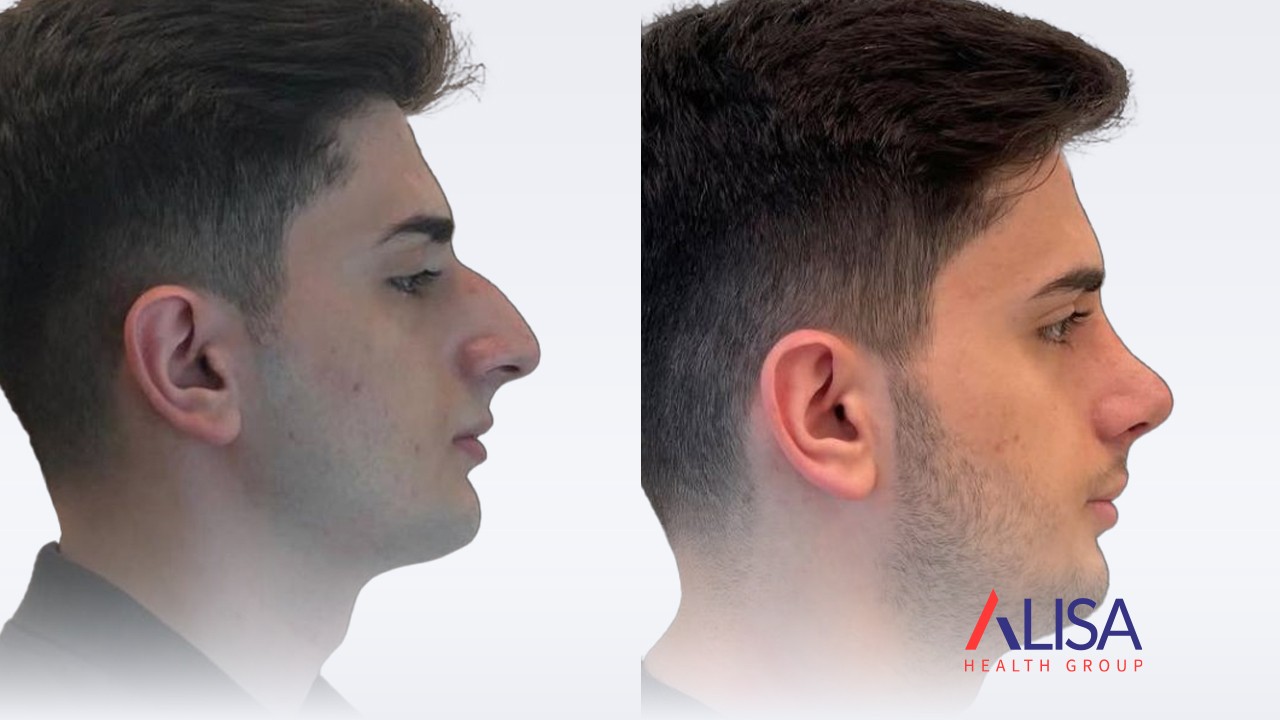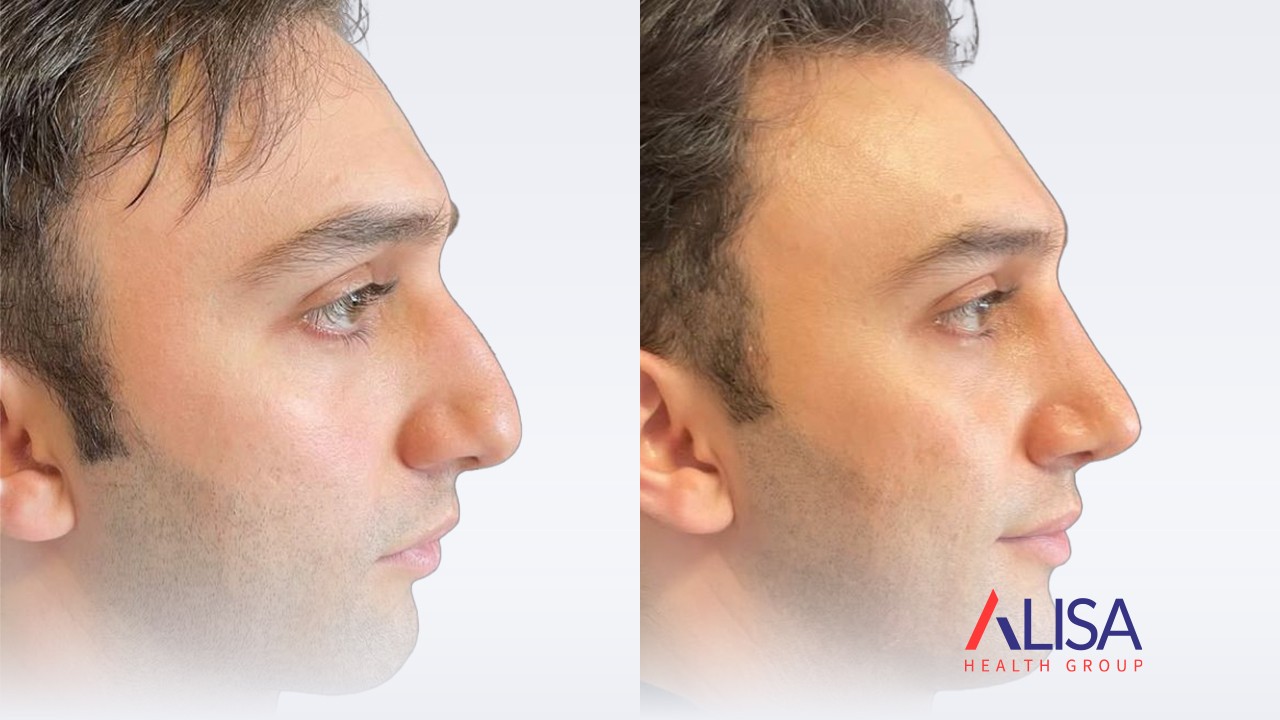Rhinoplasty. Dr. Ozlem Bayram. ISU Medical Park Gaziosmanpasha
👨⚕️ ENT surgeon consultation
🩸 Blood tests, anesthesia
🏥 Rhinoplasty surgery
👩🏼⚕️ Post-operative care
🏨 1 night hospital stay with meals
🛏 Accommodation for one accompanying person in the patient's room
👨⚕️ Follow-up appointment with ENT surgeon
💊 Necessary medications after surgery
🗣 Professional medical interpreter support at all stages
🚘 VIP transfer (airport – hotel – clinic – airport)
☎️ 24/7 patient support
👩🏼💼 Consultation on rehabilitation and further action plan after examination
Rhinoplasty is a complex surgical procedure that aims to change the shape, structure, or function of the nose. It is suitable for patients who have not previously undergone this operation and is considered one of the most sought-after in plastic surgery.
Choosing the right clinic and specialists for rhinoplasty is extremely important. ALISA HEALTH GROUP offers an innovative solution with its Alisa AI that simplifies this process. Thanks to intelligent algorithms and an extensive database, Alice selects medical institutions that meet your individual requirements and preferences. This allows not only to save time and money, but also to provide confidence in the professionalism of the selected personnel, guaranteeing the high quality of medical care.
Purposes and areas of application
1. Aesthetic corrections
- Rhinoplasty is often performed to improve the appearance of the nose, be it its shape, size or proportions. Many patients do not like the way their nose fits into the overall appearance of their face — it may be too long, wide, have a hump or other unwanted element.
- The aesthetic motivation of the operation may also include the elimination of nasal asymmetry or the correction of the tip of the nose, which may be too low, upset or disproportionately large. In some cases, patients want to make the nose more refined or graceful.
2. Functional improvements
- Functional rhinoplasty is aimed at improving breathing. Patients often suffer from breathing problems due to conditions such as deviation of the nasal septum, which can be congenital or the result of trauma.
- Additionally, the operation may involve correcting birth defects such as cleft lip and associated abnormalities that may affect the ability to breathe normally.
Preparation for surgery
Before rhinoplasty, each patient goes through an important stage of preparation, which includes several key steps. ALISA HEALTH GROUP can greatly facilitate this process by taking on tasks such as preparing the necessary documents and making an appointment with a doctor:
- Consultation with the surgeon: At this stage, the patient has the opportunity to discuss their expectations and desired results. The surgeon conducts an examination, listens to the wishes and evaluates how they can be implemented.
- Advanced technologies: During the consultation, computer simulations can be used to help the patient visualize the possible results of the operation, which is especially important for the development of an overall action plan.
- Medical examination: Before surgery, the patient may be asked to undergo a series of tests and undergo a medical examination in order to exclude contraindications to surgery.
- Discussion of anesthesia: In most cases, rhinoplasty is performed under general anesthesia, which requires discussion of preliminary precautions and preparation.
Operation progress
Rhinoplasty involves several stages that are carefully considered and performed by the surgeon:
1. Sections
- With closed rhinoplasty, all incisions are performed inside the nose, and this method is suitable for less invasive procedures.
- Open rhinoplasty involves a small incision on the columella (tissue between the nostrils), which improves access and visibility for the surgeon, especially with complex changes.
2. Changing the shape of the nose
- The surgeon can remove, move or rearrange the osteocartilaginous structures of the nose to achieve the desired shape and functionality. This may include reducing the size of the nose, smoothing its profile, or changing the shape of the tip.
3. Correction of the nasal septum
- If there are breathing problems, the surgeon may perform nasal septum straightening operations (septoplasty).
4. Completion and fixation
- After achieving all the planned changes, the incisions are closed and a splint is applied to the nose, which helps to maintain the shape and protect it during the healing period.
Postoperative period
After rhinoplasty, an important stage of recovery begins, which requires patience and attention:
- Nose care: The patient will be given detailed instructions to minimize the risk of complications. This may include recommendations for care of incisions, restrictions on physical activity, and avoidance of harmful exposures such as direct sunlight.
- Recovery time: Full recovery takes several weeks, although initial swelling and bruising are noticeable in the first week. During this period, the patient should follow the care instructions and visit the doctor for examinations.
In addition to using the capabilities of advanced AI, ALISA HEALTH GROUP actively cooperates with leading clinics and experienced surgeons specializing in septorinoplasty. This allows us to offer each client a personalized treatment plan that takes into account all the wishes and individual characteristics. We take care of all the paperwork, booking and process so you can focus on your health and wellbeing. Our consultants are always ready to answer your questions and provide support in solving any emerging problems, ensuring you the most comfortable and calm passage of the procedure.




